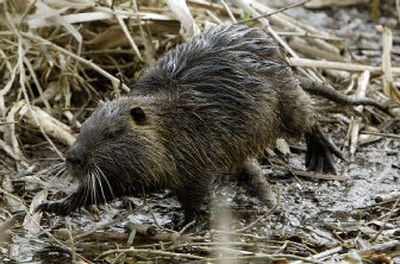Nutria found near Lake Washington

SEATTLE – A water-loving rodent native to South America that has destroyed thousands of acres of wetlands in the southeast has been spotted near Lake Washington.
Nutria are semiaquatic, chocolate-colored rodents that can weigh more than 20 pounds and eat one-quarter of their weight a day in crops and plants of all varieties. Also called coypu, or swamp rats, they burrow through marshes and levies, and females can produce more than a dozen offspring a year.
A trapper recently caught nine along the shores of Lake Washington. Two University of Washington students are studying the rodents to determine where they may show up next.
“It’s a pretty ominous picture when you bring nutria into an area where they didn’t exist before,” said Mike Davison, a wildlife biologist with the state Department of Fish and Wildlife. A statewide Invasive Species Council was recently created to track nutria and other invasive plant and animal species, and to find methods for removing them.
The council will include six state agencies and two counties and will work with federal and other government agencies, business, tribal and nonprofit groups. Washington has lagged behind states like Oregon and Idaho that already have such councils that work to prevent introduction of invasive species. Without such a council, no single agency had the authority to act, said Joan Cabreza, invasive species coordinator with the Northwest regional office of the U.S. Environmental Protection Agency.
Nationally, nutria are found in at least 15 states, including Louisiana, Texas, the Carolinas, Florida, Maryland and Oregon.
In the 1930s and ‘40s, they were raised in Washington and elsewhere for their fur. They’re vulnerable to cold and flooding, though, and it’s believed they died out of the Puget Sound region over the years.
Populations have established in southwest Washington, near Vancouver, where they’ve turned local dikes to “Swiss cheese,” said Davison.
Milder weather could have helped the nutria spread into the Puget Sound area, as well as a lack of predators like caiman and alligators in their native environment.